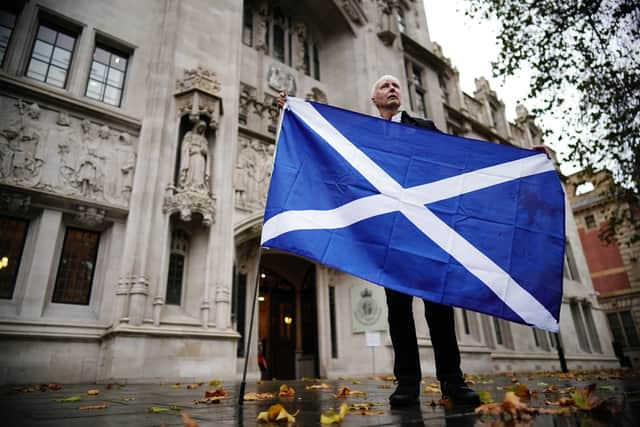Supreme Court rules Scottish Parliament doesn’t have power to hold independence referendum
and live on Freeview channel 276
The Scottish government cannot hold an independence referendum without the consent of the UK government, the Supreme Court has ruled.
A panel of five justices delivered its decision on Wednesday morning (23 November). The case was brought to the court after First Minister Nicola Sturgeon set out plans to hold a second vote on independence on 19 October 2023.
Advertisement
Hide AdAdvertisement
Hide AdThe Scottish Government’s top law officer, the Lord Advocate, asked the court to rule on whether Holyrood has competence to legislate for the vote.
During a two-day hearing in October, Dorothy Bain KC said resolving the legality of the proposed Scottish Independence Referendum Bill is a “critically important question” and would not be able to “clear” the introduction of the Bill herself without the court’s ruling. Meanwhile, Sir James Eadie KC, the UK government’s representative, argued the Bill “squarely and directly” relates to a matter reserved to Westminster.
On Wednesday, Supreme Court President Lord Reed said: “The Scottish parliament does not have the power to legislate for a referendum on Scottish independence.” The ruling means that the Scottish Government’s top law officer, the Lord Advocate, will not be able to clear the Bill for passage through the Scottish Parliament.


Lord Reed added that justices had concluded that they do have the power to give a decision over whether the Scottish Parliament has the competence to legislate for another referendum, and said the court accepted the argument that it was in the “public interest” for it to reach a decision over the issue.
Advertisement
Hide AdAdvertisement
Hide AdAnnouncing the Supreme Court’s unanimous decision, Lord Reed said that legislation for a second independence referendum would relate to “reserved matters” and was, as a result, outside the powers of Holyrood.
He said: “A lawfully-held referendum would have important political consequences relation to the Union and the United Kingdom Parliament. Its outcome would possess the authority, in a constitution and political culture founded upon democracy, of a democratic expression of the view of the Scottish electorate.
“It would either strengthen or weaken the democratic legitimacy of the Union and of the United Kingdom Parliament’s sovereignty over Scotland, depending on which view prevailed, and would either support or undermine the democratic credentials of the independence movement.
“It is therefore clear that the proposed bill has more than a loose or consequential connection with the reserved matters of the Union of Scotland and England, and the sovereignty of the United Kingdom Parliament.”
‘Scottish democracy will not be denied’
Advertisement
Hide AdAdvertisement
Hide AdResponding to the ruling, Scotland’s First Minister insisted that “Scottish democracy will not be denied” and vowed to make the country’s voice heard on independence. She said: “Today’s ruling blocks one route to Scotland’s voice being heard on independence – but in a democracy our voice cannot and will not be silenced.”
Ms Sturgeon added she would be making a “full statement” in response to the Supreme Court ruling at 11.30am.


Meanwhile, Shadow Scottish secretary Ian Murray said the court’s decision should be respected and went on to insist that “change is coming” under a Labour government, as he claimed the party could offer change to the people of Scotland.
He said: “The UK Supreme Court has made their decision and we should respect that and thank them for their work. The people of Scotland do want and need change regardless of their views on the constitution. Change is coming with a UK Labour government at the next election.”
Advertisement
Hide AdAdvertisement
Hide AdBefore the ruling was delivered, a Scottish government spokeswoman said: “There is a substantial majority in the Scottish Parliament in favour of an independence referendum and therefore a clear democratic mandate. However, as the First Minister has set out, there remains debate over whether the Scottish Parliament has the powers to legislate to hold a referendum.
“The Lord Advocate’s reference of this question to the Supreme Court was intended to achieve legal clarity on this point. We are aware a judgment will be handed down by the court and ministers will respond shortly thereafter.”
Comment Guidelines
National World encourages reader discussion on our stories. User feedback, insights and back-and-forth exchanges add a rich layer of context to reporting. Please review our Community Guidelines before commenting.
